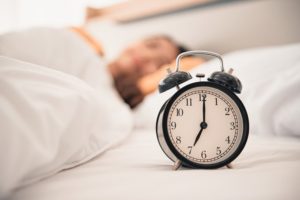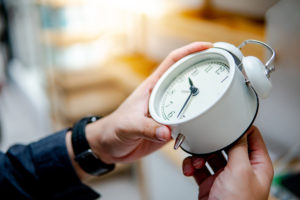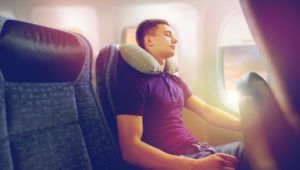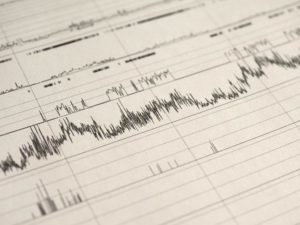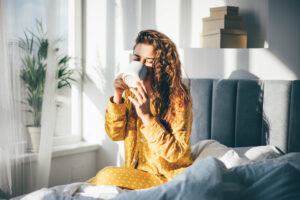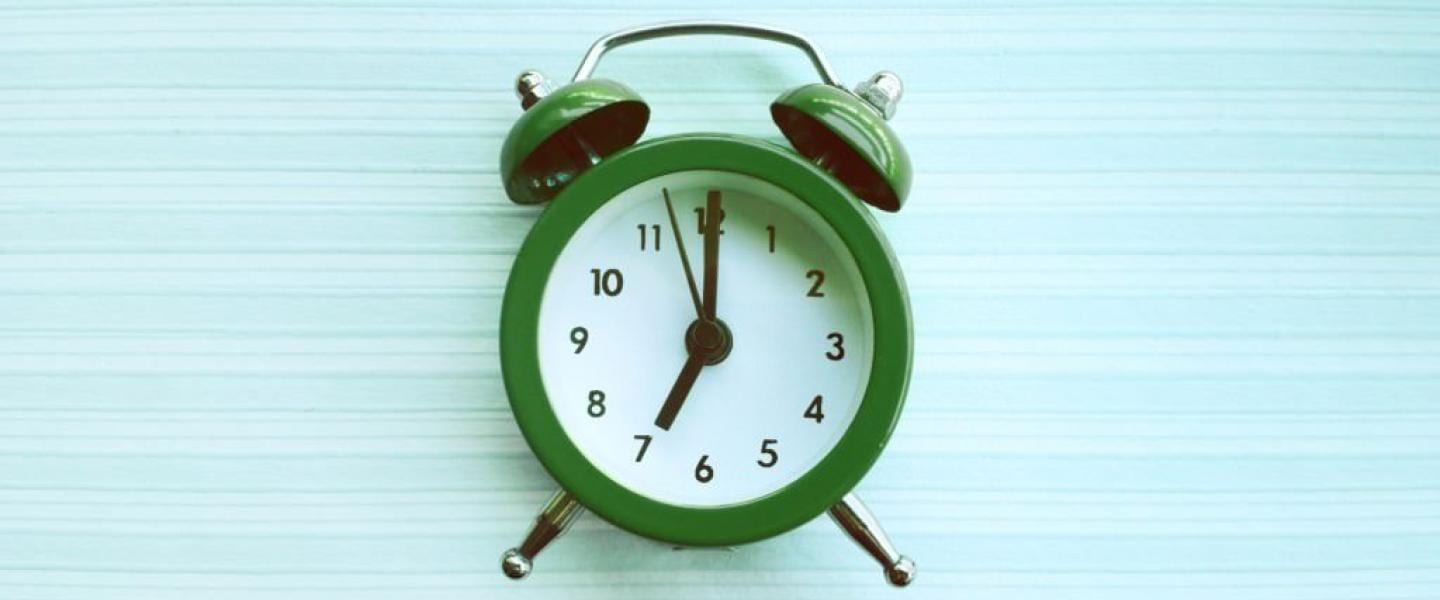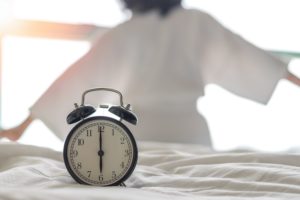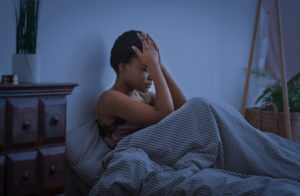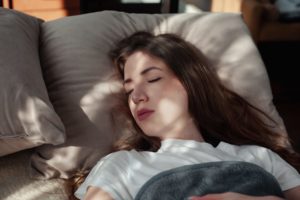When you buy through our links, we may earn a commission. Products or services may be offered by an affiliated entity. Learn more.
How to Fix Your Circadian Rhythm: 6 Easy Steps
If you struggle to fall asleep or stay awake at the times that you’d like, you might wonder if your circadian rhythm is thrown off. Over each 24-hour period, your circadian rhythms direct when you feel tired or alert, when certain hormones are released, what your body temperature is, and when you feel hungry. People looking to change their sleep schedules ultimately want to alter their circadian rhythms. We explore how to reset your circadian rhythms, particularly as they relate to sleep.
Looking to improve your sleep? Try upgrading your mattress.
What Is Circadian Rhythm?
Circadian rhythms are multiple physical changes that occur in the body at consistent times over each 24-hour period. Nearly all living beings have circadian rhythms, including plants and microorganisms. In humans, circadian rhythms are controlled by a “master” clock in the brain. These rhythms keep people in sync with their external environments.
Circadian rhythms influence when hormones are released, which in turn influence when we feel tired and awake. For example, when the eyes are exposed to darkness, they produce the hormone melatonin. Melatonin then makes a person feel tired and want to sleep.
How to Reset Your Circadian Rhythm
You can reset your sleep schedule and circadian rhythms through lifestyle changes, because environmental factors impact these rhythms. Circadian rhythms are primarily influenced by the eyes being exposed to light and darkness, but they can also be affected by exercise, eating, and other factors. If you want to shift your circadian rhythms, try these tips.
Gradually Adjust Your Schedule
As you begin to adjust your schedule, start slow. Instead of changing your sleep and wake times by several hours at once, adjust by an hour or less each day until you reach your desired schedule. Once you’re going to sleep and waking up at the times you’d like, stay consistent every day, even on weekends and days off work.
Jet lag gives an example of how drastically changing your daily schedule overnight can bring about negative consequences. When a person travels across several time zones, their circadian rhythms become mismatched with their environment. As a result, they may experience symptoms including trouble sleeping, daytime tiredness, digestive issues, and impaired cognitive ability.
Get Outside Early in the Day
Exposing your eyes to bright light at specific times can help you strategically adjust your circadian rhythms, including your sleep schedule. If you want to wake up earlier in the day, get light exposure in the morning, shortly after you wake up. If you want to stay up later at night, get light exposure in the evening or night, once you’re feeling tired.
Morning sunlight works well to help reset circadian rhythms, since human circadian rhythms evolved in response to living on a planet with daylight and dark nights. If you don’t live in a sunny area or can’t easily access the outdoors, you can also use a bright light therapy lamp for light exposure.
Change Your Meal Times
Just like tiredness and sleep schedules, hunger and metabolism are closely linked to circadian rhythms. Research has found that eating meals at later times can shift circadian rhythms later. Similarly, eating breakfast immediately upon waking and avoiding late dinners has been found to help shift circadian rhythms earlier.
If you want to wake up earlier, begin eating earlier. If you want to stay up later, eat later. And as with all circadian rhythm changes, once you’re on the schedule you desire, try to keep it consistent and eat meals at the same time each day.
Limit Alcohol and Caffeine
Caffeine may potentially help you feel less tired as you adjust your sleep schedule, but it won’t help adjust underlying circadian rhythms. Caffeine can disrupt sleep, which may cancel out any benefits it provides. Try to limit the amount of caffeine you consume, especially late in the day.
Similarly, people sometimes turn to alcohol to help themselves fall asleep. This isn’t a good strategy. Alcohol can disrupt sleep and amplify the effects of sleep deprivation. Limit alcohol intake and avoid consuming at least one hour before bedtime.
Avoid Exercising Too Late
Exercising close to bedtime may disrupt your sleep and throw off your circadian rhythms, especially if you’re a morning person. Exercising regularly promotes healthy sleep, however. If you’re trying to wake up and go to bed earlier, consider exercising in the morning.
Reduce Artificial Light Exposure
Since humans evolved to live in synchrony with the daily sunlight schedule, artificial light exposure during outdoor dark hours can disrupt circadian rhythms. Blue light has been found to most strongly impact circadian rhythms. Since digital devices like TVs, smartphones, computers, and tablets emit blue light, it’s best to practice the healthy sleep habit of avoiding these in the hours before bed. Dimming other indoor lights in the hours before sleep may also be useful.
What Throws Off Your Circadian Clock?
Anything that impacts circadian rhythms can throw off your master clock and sleep schedule when experienced at the wrong time. These factors include:
- A lack of exposure to sunlight during daylight hours
- Exposure to artificial light, especially blue light, during dark hours
- Eating meals or snacks off-schedule or at inconsistent times
- Going to sleep and waking up at inconsistent times
- Exercise or other physical activity too close to bedtime
- Working the night shift or other forms of shift work
- Traveling across different time zones

Still have questions? Ask our community!
Join our Sleep Care Community — a trusted hub of sleep health professionals, product specialists, and people just like you. Whether you need expert sleep advice for your insomnia or you’re searching for the perfect mattress, we’ve got you covered. Get personalized guidance from the experts who know sleep best.
References
4 Sources
-
Goldstein, C. (February 2024). Jet lag. In R. Benca & A. Eichler (Ed.). UpToDate.
https://www.uptodate.com/contents/jet-lag -
Facer-Childs, E. R., Middleton, B., Skene, D. J., & Bagshaw, A. P. (2019). Resetting the late timing of ‘night owls’ has a positive impact on mental health and performance. Sleep Medicine, 60, 236–247.
https://pubmed.ncbi.nlm.nih.gov/31202686/ -
Bumgarner, J. R., & Nelson, R. J. (2021). Light at Night and Disrupted Circadian Rhythms Alter Physiology and Behavior. Integrative and comparative biology, 61(3), 1160–1169.
https://pubmed.ncbi.nlm.nih.gov/33787878/ -
Wehrens, S. M. T., Christou, S., Isherwood, C., Middleton, B., Gibbs, M. A., Archer, S. N., Skene, D. J., & Johnston, J. D. (2017). Meal Timing Regulates the Human Circadian System. Current biology : CB, 27(12), 1768–1775.e3.
https://pubmed.ncbi.nlm.nih.gov/28578930/



